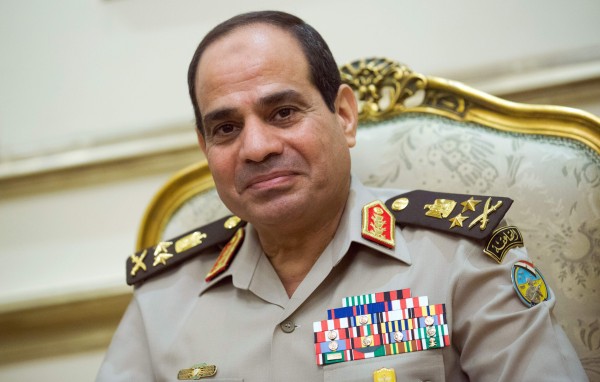In Egypt, Censorship Means Polarization
October 22, 2014

While I was waiting for my coffee from a Halal truck vendor, the Egyptian fellow preparing my drink asked me if I was a Morsi or Sisi supporter. Though I strongly defy Sisi, I was not a Morsi supporter either. Then, I realized that I was bound to this polar framework: In his mind, I was one of “them.”
On July 3, 2013, Abdulfattah Al-Sisi, a former army chief, toppled and imprisoned Egypt’s first elected president, Mohamed Morsi. Ever since he took office, a celebration rang out in his support. Musicians made songs for Sisi, and every day was a celebration in the streets of Egypt. Egyptians thought that change was bound to happen. And it did. Morsi’s former organization, the Muslim Brotherhood, was banned with the label of terrorism. In addition, an entire Rabaa Square of protesters who wanted the democratically elected president back, were brutalized, jailed and murdered. That was not the surprise. The surprise took place when unconsciously, Egyptians began to divide. You were either a Sisi or Morsi supporter. Families and friends separated over their political disagreements. All media outlets supported the new government, and it was not a choice.
Without a doubt, censorship is to blame for this political division in Egyptian society. Sisi has enabled censorship by placing his own puppets in the media so that he is represented as a god-like figure. News anchors and political show hosts refer to the president respectfully as General Abdulfattah Al-Sisi and defend him at all times.
After Morsi’s removal, most of the media outlets have suggested that the military-backed government is not only the right way to govern, but the only way. Al Jazeera is the only news outlet that is trying to represent the voices of those who have been silenced. As a result, Al Jazeera English journalists Peter Greste, Mohammed Fahmy and Baher Mohammed have been detained in Egypt since December 2013 and accused of spreading false news and supporting the now outlawed Muslim Brotherhood.
Similarly, Bassem Youssef, a TV personality known as Egypt’s Jon Stewart because of his satirical approach, ended his show in June. In a press conference, he made it clear that it was no longer safe to satirize Egyptian politics. He told reporters: “I’m tired of struggling and worrying about my safety and that of my family.” Sisi does not outright ban the voices of dissent from mass media outlets, rather he has silenced them by means of fear. “You can always implement some sort of a mood, without actually giving direct orders […] it reflects badly on the freedom of speech in Egypt,” Bassem stated.
On Thursday, Sept. 25, President Obama and Al-Sisi met to discuss the fate of jailed Egyptian journalists and political oppression among other issues. Yet, nothing has changed.
If you decide to oppose the Sisi in any means, you will automatically be labeled as a terrorist and a supporter of the Muslim Brotherhood. And what happens to terrorists? They are either instantly killed or jailed. On Friday, Oct. 10, 91 university students were beaten then arrested by Egyptian police. This includes female students, an act which is viewed as a form of disrespect in Egypt. In the past, if people protested, the majority of those imprisoned were men. For punishment, the police used electric shock and nudity. With the new government, many young women are jailed and raped by male police officers. This is a form of intimidation and sexism.
Sisi is a man who polarized Egyptians; he is a criminal. As a means of political repression, Egypt has been divided by an “us-versus-them” mentality. The “us” are those who strongly support Al-Sisi (including the military, violent police forces and media). On the other hand, “them” is a representation of those who oppose Sisi in any way, supporters of Al Jazeera news and left-wing Egyptians. This mentality creates an unconscious divide which causes people to fear one another. Additionally, it becomes easier for the government to interfere, control and lead. To be fair, the Egyptian government may never reach democracy. This invisible isolation has become the social norm and a problem. Every neighbor feels that if they were to share their political belief, they could be reported on. They would rather hang up a framed picture of Sisi with his smug smile and keep silent. To be honest, I may never feel this peaceful chaos in the streets of Egypt again. But if anything, I am proud to be one of “them.”












